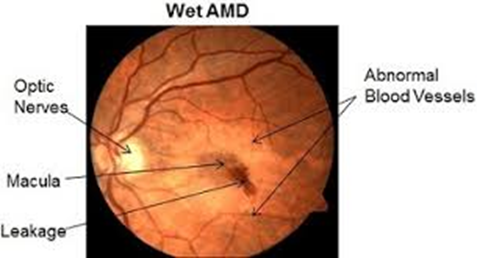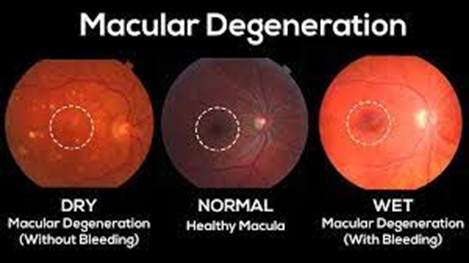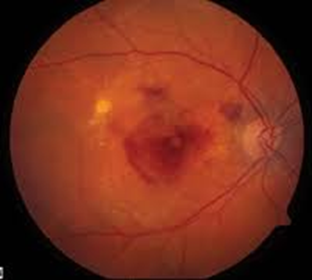Wet macular degeneration
Overview
Wet macular degeneration is a chronic eye disorder that
causes blurred vision or a blind spot in your visual field. It's generally
caused by abnormal blood vessels that leak fluid or blood into the macula (MAK-u-luh).
The macula is in the part of the retina responsible for central vision.
Wet macular degeneration is one of two types of
age-related macular degeneration. The other type — dry macular degeneration —
is more common and less severe. The wet type always begins as the dry type.
Early detection and treatment of wet macular degeneration
may help reduce vision loss and, in some instances, recover vision.
Symptoms & causes
Visual distortions, such as straight lines seeming bent
Reduced central vision in one or both eyes
The need for brighter light when reading or doing
close-up work
Increased difficulty adapting to low light levels, such
as when entering a dimly lit restaurant
Increased blurriness of printed words
Decreased intensity or brightness of colors
Difficulty recognizing faces
A well-defined blurry spot or blind spot in your field of
vision
Macular degeneration doesn't affect side (peripheral)
vision, so it rarely causes total blindness.
When to see a doctor
See your eye doctor if:
You notice changes in your central vision
Your ability to see colors and fine detail becomes
impaired
These changes may be the first indication of macular
degeneration, particularly if you're older than age 60.
No one knows the exact cause of wet macular degeneration,
but it develops in people who have had dry macular degeneration. Of all people
with age-related macular degeneration, about 20% have the wet form.
Wet macular degeneration can develop in different ways:
Vision loss caused by abnormal blood vessel growth.
Sometimes abnormal new blood vessels grow from the choroid under and into the
macula (choroidal neovascularization). The choroid is the layer of blood
vessels between the retina, and the outer, firm coat of the eye (sclera). These
abnormal blood vessels may leak fluid or blood, interfering with the retina's
function.
Vision loss caused by fluid buildup in the back of the
eye. When fluid leaks from the choroid, it can collect between the thin cell
layer called the retinal pigment epithelium and the retina or within the layers
of the retina. This may cause a bump in the macula, resulting in vision loss or
distortion.
Risk factors
Factors that may increase your risk of macular
degeneration include:
Age. This disease is most
common in people over 55.
Family history and genetics.
This disease has a hereditary component. Researchers have identified several
genes related to developing the condition.
Race. Macular degeneration is
more common in Caucasians.
Smoking. Smoking cigarettes
or being regularly exposed to smoke significantly increases your risk of
macular degeneration.
Obesity. Research indicates
that being obese increases the chance that early or intermediate macular
degeneration will progress to a more severe form of the disease.
Cardiovascular disease. If
you have diseases that affect your heart and blood vessels, you may be at
higher risk of macular degeneration.
Complications
People whose wet macular degeneration has progressed to
central vision loss have a higher risk of depression and social isolation. With
profound loss of vision, people may see visual hallucinations (Charles Bonnet
syndrome).
Prevention
It's important to have routine eye exams to identify
early signs of macular degeneration. The following measures may help reduce
your risk of developing wet macular degeneration:
Manage your other medical conditions.
For example, if you have cardiovascular disease or high blood pressure, take
your medication and follow your doctor's instructions for controlling the
condition.
Don't smoke. Smokers are more
likely to develop macular degeneration than are nonsmokers. Ask your doctor for
help to stop smoking.
Maintain a healthy weight and exercise
regularly. If you need to lose weight, reduce the number of
calories you eat and increase the amount of exercise you get each day.
Choose a diet rich in fruits and vegetables.
Choose a healthy diet that's full of a variety of fruits and vegetables. These
foods contain antioxidant vitamins that reduce your risk of developing macular
degeneration.
Include fish in your diet.
Omega-3 fatty acids, which are found in fish, may reduce the risk of macular
degeneration. Nuts, such as walnuts, also contain omega-3 fatty acids.
Jan Ricks Jennings, MHA, LFACHE
Senior Consultant
Senior Management Resources, LLC
JanjenningsBlog.Blogspot.com
412.913.0636 Cell
724.733.0509 Office
June 13, 2022




No comments:
Post a Comment